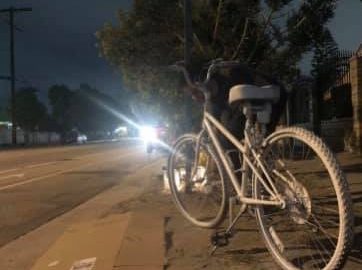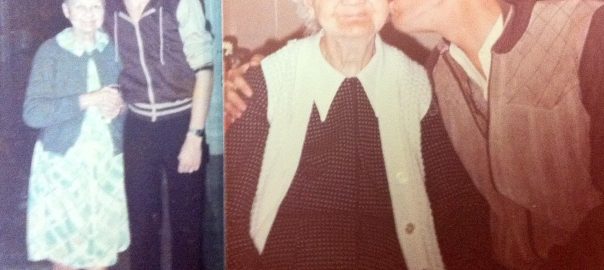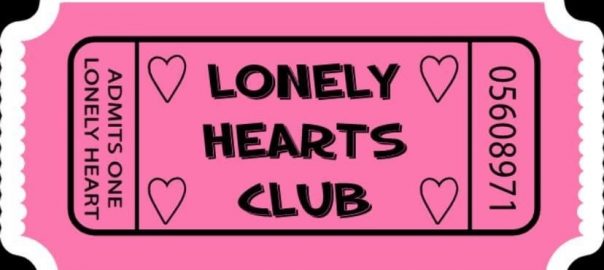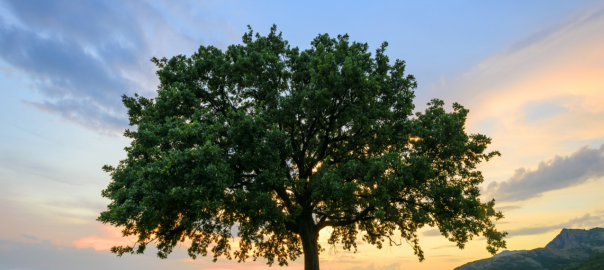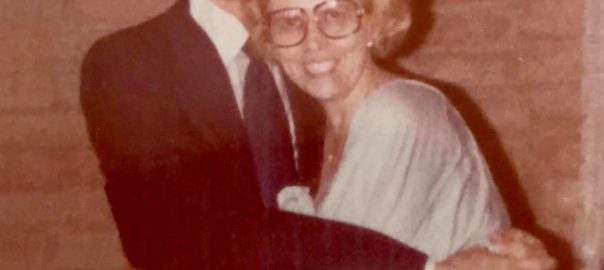I buried an old woman in my backyard.
My two young daughters and I dug a hole, put her in, said some farewell prayers and cried. It was more than 35 years ago and I still miss her terribly.
Her name was Josie Brown. She was originally from Sapulpa, Oklahoma, a little town in the northeast part of the state smack dab in Tornado Alley. I remember that because all my life I’ve been fascinated by tornadoes and she would tell me tales of those “wicked winds” nearly every visit if I’d ask. I’d like to say I remember exactly how she made her way to live and die here in Las Vegas of all places, but I don’t. But I do know that for the last several years of her brittle life, I was her closest friend. I was her only friend.
I got the call from the mortuary one afternoon at work.
My family-owned advertising agency business was in its peak years. Clients were demanding. I rarely left for lunch unless it was to treat a client. None of us did. The agency was an incredible firm staffed with 21 employees, five of which were my family members. Miller & Associates was a great place to work. We took care of each other and our employees. We had each others’ backs before it became a cliché.
I was writing some quick ad copy for a banking client so dad could get the ad typeset and out for production to make the newspaper deadline that evening. We were never late, even with the most last minute of rush jobs. And because of our impeccable reputation for timely payment, honesty and fairness, we very well could have been late and the paper would have made exception for late insertion without question. They didn’t do that for anyone else to my knowledge.
Judi paged my office, “Donnie, there’s a call on line 4 but I can’t tell what it’s about. Some mortuary. Are we pitching a mortuary for God’s sake?” She was a riot, my mom’s assistant, and her best friend. She might as well have shared our surname.
We were always pitching business and the company was so well run by the Miller & Associates staff, it wasn’t unheard of for companies to pitch us to handle their advertising, marketing and public relations needs.
“Hello, this is Don. How can I help you?,” I answered, still frantically “keyboarding” the rush copy for dad on my brand new, state of the art Kaypro 256 computer. The entire hard drive was 256MB and the $2,000 investment made the now obsolete IBM Selectric 3 my sister still used for typing her press releases in the next office a noisy nuisance. I closed the window between our offices.
“Good afternoon. Is this Donald Miller?,” the woman on the other end asked.
“Yes ma’am, this is.”
“This is Bunker Brothers Mortuary on Las Vegas Boulevard South. We have Josie Brown here for you to pick up.”
It had been a long time since I’d last seen Josie or heard her name but not as long since I’d thought about her. I knew the call wasn’t that Josie was waiting for me in their lobby for a ride to the store.
Josie had passed the week prior. The cause of death was unknown, but I knew better. She died of loneliness. A lifetime of it. She was 84, and had earned every year of it.
“We called her nephew, a Pastor in Sapulpa, Oklahoma. He’s the only kin she has left. They didn’t want her,” she said rather hastily, as if families routinely rejected the cremated remains of their deceased kin.
Having worked phone sales at a cemetery once before many years earlier, I would eat lunch out by the crematorium and on some days when the door was open, I’d go inside and look around. Little plastic twist-tied grey bags of so many unknown souls lined shelf upon shelf around the big burning ovens. No one had come for them. No one had claimed them. Their final resting place was a wooden shelf among strangers with a daily view of the ovens which had incinerated their existence like so many others.
“He what?!,” I replied in disbelief. “He refused her cremains?”
“Yes, Mr. Miller, that is the case. Your name is the only other contact we found in her belongings when she passed. If you don’t want her, we’ll just put her out for disposal.”
I made arrangements to get her after work and called my wife to say I’d be late, but I didn’t say I was bringing company home. For good.
I first met Josie Brown when I was a 17 year old Bonanza High School student. I’d been elected Student Body President at the new high school that year and our student council had planned a Christmas visit to the old folks home on the corner adjacent to the school stadium. It was just another service project like so many service projects we’d done before.
We were armed with decorations, holiday cookies, snacks, a council secretary who played an impressive single finger piano, me with my guitar and all those we could recruit for the early evening event. We were given a certain window of time to get in and get out as the staff didn’t want med and sleep schedules interrupted, likely for fear they might miss the start of their favorite prime time programming.
It was a dismal place. The only holiday décor in sight was what we’d brought, and this was a week before Christmas. The caretaking staff tolerated the visit of our dozen or so teens. I think we were all genuinely happy to be there, though. It was that rare feeling in youth when you do something good for someone else when all you’ve ever been concerned about at that age has been yourself. I’m not sure if that was the source of our smiles or if it was seeing the room of lonely pajama’d octogenarians leaning in chairs and wheelchairs, none standing, fewer smiling.
It wasn’t organized this way but it seemed like each of us picked one resident for the evening. But in my case, I’d quickly realized it was I who was chosen.
She sat in a modest blue calf length house dress with brittle weathered hands folded in her lap atop one another. It was her smile that had caught my attention. She was, to the best of my memory, the only one whose face carried any expression at all. Her rich blue eyes had long since clouded over with cataracts, especially the left one. It was probably not the only untreated illness she’d endured for as many years as she had lived there.
I say “lived,” but there was no life at that place. At least not as we experience life, especially then as self-indulgent teens who’d volunteered our time that evening without any real inconvenience. It was a two hour Friday night stint and we could party afterward. I know, privately, through the smiles, each wondered when the project would be over. It was a gloomy sadness we experienced that evening, a stark contrast to the colorful, loud, joyous fun times we had been enjoying in preparation for the holiday outside those walls.
Josie’s seat was closest to the piano and her cloudy blues summoned me to the empty chair at her side.
“Hi! Are you having fun?,” I asked in adolescent naivete.
“Well hello young man. And yes, this is wonderful, thank you,” she replied with the distinct southern drawl of a proper lady.
“My name is Don Miller and we are so glad to be here with you this evening. What is your name?”
“Josie. My name is Josie Brown Don Miller.”
“Well that’s funny, we share the same last name “Josie Brown Don Miller!,” I said in a lame attempt at humor an 80 something old woman wasn’t likely to get. I was 17, quite sad at the time and I think my attempt was really to boost my own mood, not hers. I’d confused her a bit with my humor and it was embarrassingly obvious.
“So, Josie, how have you been?,” I asked as if it had been awhile since our last visit, with a woman I’d never seen her before in my life.
“Well fine, Don.” She spoke softly as the single finger pianist next to us pounded out the notes of some indistinguishable Christmas hymn. It was hard for her to hear me and while she loved music, this was not music. She was getting uncomfortable and anxious at all the sound and action around. Surely, it was more noise and action her group had heard and seen in perhaps years.
Relocating to two vacant chairs across the room took some time, of course. Once seated in the still warm chairs which had been vacated minutes before by two other residents who had already returned to their rooms for any number of reasons, Josie and I began to talk.
“Well, Don, I’m from Oklahoma. Do you know where that is?”
“Of course I do. That’s where Tornado Alley is, right?” I was attempting to find a topic for a conversation starting point and it was easier to begin with something of interest to me than to her.
Josie and I talked tornadoes, family, Christmas memories and all the topics of holiday chats. It was apparent she’d had a rich life history of stories which had rarely, if ever, been told. Nobody was interested. Drinking our punch from styrofoam cups and an occasional bite of a store bought sugar cookie, I listened.
Our two hour gig was up 20 minutes ago and most of my classmates had long since said their goodbyes and lies to come back and visit again soon. Me, I couldn’t get out of my chair.
That frail old woman had captivated me that night. Her stories of Midwest living, life on the farm, the hard times and hard work of being a prairie woman in the grain fields and the vivid imagery of a kind of country life this city boy had only read in books had brought us into the third hour of the evening. The nurses had cleaned up, patients and residents were long since in their rooms asleep and we had been cued at least twice by one of the nurses that it was time to go.
That night changed my life forever.
Many years later during my graduate program and a class named “Society and the Psychology of Aging,” I had written a shortened version of this story for my final class project. I have looked all over for that essay, especially the photo of Josie that I’d paired with it. I have yet to find it. It is important because it is the only photograph of her that I have. I don’t need it, really. Her face is as clear in my now own rapidly aging mind as that night in the Torrey Pines Convalescent Center. My short essay for the class, the last one presented before the Christmas break, brought the entire class to tears. I got an A and a million questions about this magical pioneer woman who’d stolen my heart. I have since found two photos.
A little more than a week after having met Josie, I returned. It was either Christmas Day or Christmas Eve, I don’t recall. What I do remember, however, made me more sad than I’d initially been on my first visit. Except for the skeleton crew of workers and the residents, the place was void of visitors. It was the biggest holiday of the year, and nobody was celebrating. Nobody had reason to.
Checking in at the nurse’s station, I managed approval to visit Josie. Walking down the dingy linoleum hall, gift in hand for Josie, I paused just a little at each door to see how other residents might be spending their holiday. It was cruel. Seeing some stranger at their doors this holiday, even for an instant, brought small words of welcome, believing they were the one selected to be remembered that cold winter day. As I walked on, door to door, the expressions were the same. I had brought one gift for Josie and in that short walk down the hallway, had broken the dreams of so many bedridden others.
Josie was startled by my visit and said all the quiet humilities to me of how she didn’t deserve such a treat, especially since I had family to be with. Her room was darkened and not so good for her already impaired vision. She was wrapped in a thin blanket, half reclined in her bed. The night stand was empty except for a table lamp with a low watt bulb, the only illumination for her holiday. No cards. No gifts. No trinkets or holiday snacks. The room was cold, austere and obviously designed to make the outgoing of one resident and the incoming of the next as seamless as possible. They were not in the business of keeping beds empty.
Her room was shared by another elderly woman who had died during the week and Josie expressed anxiety wondering who her next roommate might be. “I hope she’s not mean,” she said. “The lady who was here was not a very kind person. She was loud and kept me up all night, Don,” she continued. I was pleased she’d remembered my name.
I presented her my gift, a digital alarm clock radio, which she opened slowly marveling as if it were the crown jewels. Hastily, though, she pulled open her nightstand drawer and placed it inside, closing the door and looking over her shoulder as if she were a bandit hiding her loot.
“You know, it would probably look better if you put it on your night stand and plugged it in, Josie,” I joked. Looking at me, she was puzzled a bit, but cautiously retrieved the gift from the drawer and I installed it on her table. The volume of the radio was factory set to max and as I tried to demonstrate the many functions, she was frightened as I clamored to find the volume control. It hadn’t been programmed so the loud shriek of radio static coming from room 24 had disturbed countless residents down the hall. No nurses though. They were at their station having a holiday potluck of their own. The radio sound could have been shrieks of agony from a resident and they would have known no difference.
Josie told me that she was reluctant to leave such an expensive gift out in the open for long as “they take things, you know.” Whether it was her now deceased roommate, other residents or the nurses, she was definitely afraid of losing the $20 gift I’d brought her.
We talked for awhile, occasionally pausing as a patient on a walker meandered past the open door destined for a hard seat in the TV room down the hall. Josie was big on privacy and not just a little paranoid, I’d thought. She mentioned the family in Oklahoma she hadn’t seen nor heard from in many years but was obviously proud of her nephew Richard, who was a pastor back in Sapulpa. He had a large congregation in the very small town, last she knew. I asked if she’d heard from him for the holidays and though it was quite obvious she’d heard from no one, she made excuses on his behalf about the many miles between them, the possibility that the nurses had intercepted his greeting cards or that the holiday season was his busiest time.
I never heard if she had any other living relatives. On my visits, I tried to keep the topics current and relatively upbeat.
I came back almost weekly from there on out. I usually brought some sort of gift or trinket for her drawer and we’d chat for an hour until I had to be back to work. As years passed, I followed her to three other convalescent centers after her Torrey Pines eviction. Each one was progressively worse, dingier, dirtier, even less involved and more disinterested than the one before. Nursing home prices went up and her small government check could buy her fewer and fewer conveniences.
And as those years passed, I was ashamed to have scheduled less and less time for her. Weekly visits became biweekly, then monthly and eventually only on the major holidays. Each time I would track her down in those later years and show up unannounced. She was always as cheerful to see me as on that first Christmastime visit.
I learned more about myself during those times than I knew what to do with. And writing this, even now I’m still very much at a loss with the emotions.
I’d become busier with work, marriage, family and home that I didn’t seem to make time for even a quick visit now and then. I was secretly ashamed of myself but shared the sentiment with no one but my conscience.
My feelings of guilt over having gradually abandoned her like everyone else in her life had done were laid to rest the day my kids and I buried that small, sealed brown box which contained the remains of the old prairie woman from Sapulpa who had more than once captured my heart.
“Was there anything else?,” I asked at the mortuary that afternoon picking up Josie’s cremains. “She had many possessions I’d given her over the years.”
“No, nothing was turned in but this Valentine card with her picture. That’s how we knew to contact you because your name and phone number were on the back.”
The red construction paper with deckled edges and a wallet sized photo of Josie inset in a lacy red heart in the center read, underneath in pencil:
To my friend, Don Miller.
Love your friend, Josie Brown.
When my family moved from that home to a bigger one, we’d packed and cleaned it out and were already moved into the new place when I’d remembered one box I’d forgotten to pack in the move.
I raced back to the old house and shoveled and dug on my hands and knees for hours into the night in the mound of dirt in the corner of the yard where I’d laid Josie’s brown box to rest so many years before.
I never found her.
The angels had beat me to it, and Josie was no longer alone.
I know I will meet up with her again someday, and like old times, we will talk of tornadoes and Christmases once again.
